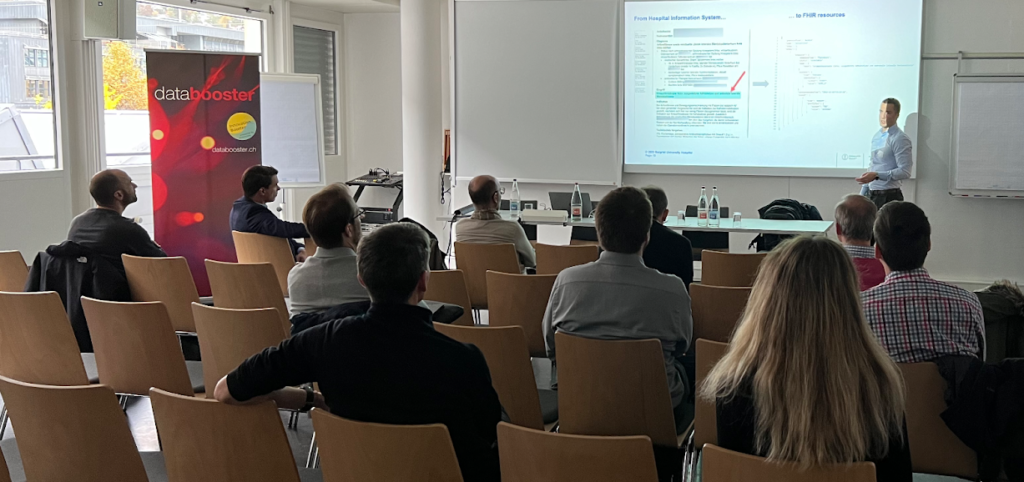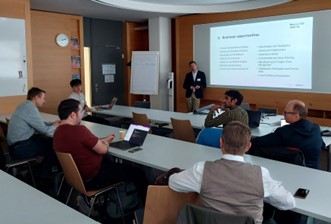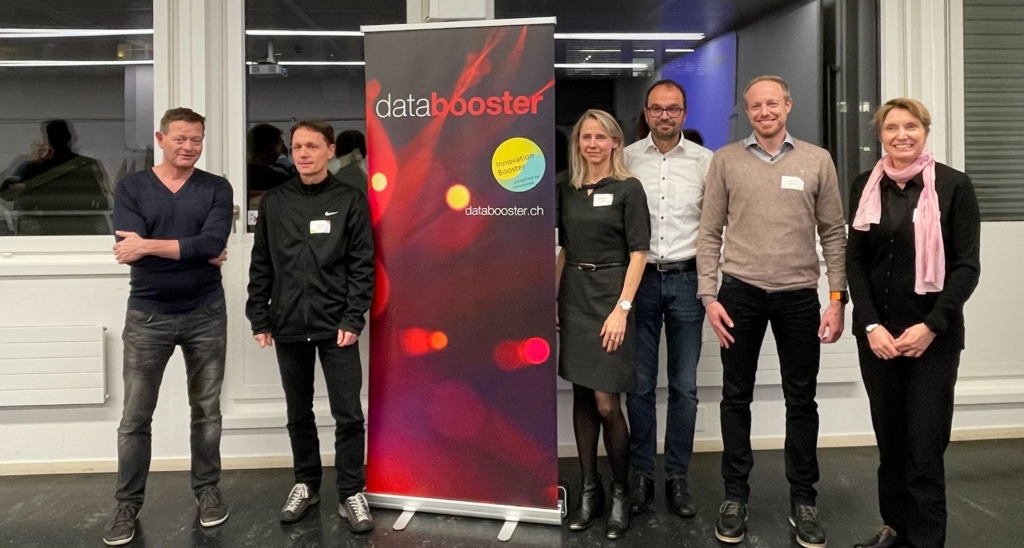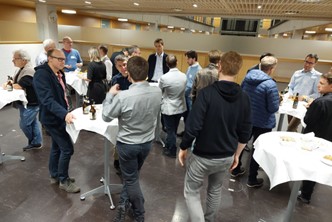
Expert Day & General Assembly – Technopark Zurich
By Milena Perraudin, data innovation alliance
On the 13th of November, the data innovation alliance organized yet another impactful Expert Day at the Technopark Zurich. This edition of the Expert Day seamlessly intertwined with the annual General Assembly, presenting an enticing program to learn, exchange and get inspired. Welcoming over 30 participants, the event enfolded plenty of opportunities for engagement within the three Expert Groups: ‘Digital Health’, ‘Smart Services’ and ‘Data Sharing and Visualization’.
The event started with the Expert Group Meetings, featuring three concurrent sessions led by subject-specific experts, followed by engaging discussions among the participants. Transitioning into the plenary session, Oliver Dürr from the University of Zürich and the University of Fribourg delivered a thought-provoking keynote on how we can contribute to a future worth wanting. In the following General Assembly, Andrea Dunbar was elected as a new board member. Closing the event in customary fashion, participants enjoyed an aperitif, a delightful opportunity to unwind and cultivate connections.
In this blog post, we take you through the highlights of the day.
Expert Group Workshop Data-Driven Healthcare by Digital Health
The Expert Group Digital Health delved into the transformative intersection of advanced data analytics and healthcare. The rise of sophisticated data analytics has heralded a new era for healthcare organizations, offering more profound insights into patient management and enhancing the efficiency of clinical decisions. By fusing data-centric clinical study with comprehensive care, we are spearheading a healthcare transformation that prioritizes the use of data to convert medical observations into practical insights. Nonetheless, the journey is marked with challenges, particularly concerning data interoperability. Given the diversity of data sources in healthcare—ranging from clinical information systems to patient surveys, diagnostic tools, and biobanks—interoperability extends beyond system-to-system communication to include all parties involved in healthcare delivery. Essentially, data must be interpretable by both the technology and the human elements within the healthcare continuum.
During today’s seminar, we delved into the subject of data interoperability through the lens of both healthcare providers and industry experts. Sebastiano Caprara, who leads the Digital Medicine Unit at Balgrist University Hospital, shared their strategies for overcoming interoperability hurdles in consolidating clinical data for research purposes. They have established a series of repositories where data is not only anonymized but also structured for easy access by researchers, bypassing the need to navigate through disparate clinical databases. Caprara outlined their progressive steps towards utilizing data-led clinical research to advance integrated care, starting from the raw clinical data to exploiting extensive data stores to identify trends, forecast health outcomes, and refine clinical practices.

Complementing Caprara’s broader view on interoperability, Aron Horvath from Unit8 presented a focused example of a data-oriented solution for diagnosing abnormalities in electrocardiograms (ECG). They have introduced an open-source framework that utilizes ECG time-series data to pinpoint health anomalies, thereby enabling healthcare practitioners to make well-informed decisions that enhance patient care. While this tool is in its nascent stages, it is constantly evolving and improving, benefitting from the contributions of its active community of expert users, owing to its open-source status.
Expert Group Workshop Social Value Creation by Smart Services
The Expert Group Smart Services met for a workshop on social value creation by Smart Services. Social values are an important factor of a sustainable business strategy. One common way to understand sustainability is the triple bottom line concept. It states that firms should commit to measuring their social and environmental impact, in addition to their financial profit. The triple bottom line can be broken down into “three Ps”: profit, people, and the planet. Firms can use these categories to conceptualize their environmental responsibility and determine any negative social impacts to which they might be contributing. The workshop began with an introduction to the topic by the organizers, followed by a presentation by the master student project of Robin Stieger. Focusing on “people”, the presentation was centered around the terms health, safety, knowledge and education, skills, and employment. The group discussed how social value is created on an individual level, but also on a community level.

Among various workplace health topics, also the importance of avoiding jobs in dangerous or hazardous environments and giving access to work to people was discussed. Additionally, the positive and potentially negative impacts on individual and collective competences of doing work assisted by smart services was discussed. Among others, enterprise social networks got special attention in the workshop. For instance, organizations form successful strategic partnerships with nonprofit organizations that share a common purpose-driven goal.
Overall, the workshop was a great success, and the group came up with many innovative ideas for promoting social value creation by smart services.
Expert Group Workshop Spatial Computing for Business Opportunities by Data Sharing and Visualization
The Expert Group Data Sharing and Visualization delved into spatial computing, a trendy facet of data visualization. This innovative approach merges computer-generated visuals, such as digital twins, with real-world counterparts, enriching them with pertinent contextual information. Under the guidance of Prof. Antoine Widmer from the HES-SO Valais Research Institute in Informatics, the focus was on the diverse business applications enabled by spatial computing. Participants unanimously recognized the significant potential of spatial computing, particularly in terms of advancing data visualization within the context of human-AI interaction.

Keynote Humanity, AI and Innovation: What Future Do We want?
In Oliver Dürr’s keynote on ‘Humanity, AI, and Innovation: What Future Do We Want?’ the overarching question posed was, ‘How can we all contribute to a future worth wanting?’. The key takeaways emphasized adopting a holistic-integral perspective in addressing this question. Furthermore, he advocated for the design of technologies, processes, businesses and institutions in alignment with values and aims that benefit society sustainably. He further highlighted that ethics cannot be added at the end of an innovation process but must be ingrained from the beginning. Dürr recommended starting with ‘Value Based Engineering’ and the ISO/IEC and IEEE 24748-7000 standard.

General Assembly (GA)
Thilo Stadelmann (ZHAW Center of AI) made the decision to step down from the data innovation alliance board after eight years. As a foundational member from day one, Thilo Stadelmann played a pivotal role in the alliance’s success, and we express our sincere gratitude for his exceptional contributions.
In the spirit of new beginnings, we extend a warm welcome to Andrea Dunbar (CSEM & EPFL), unanimously elected as the new board member – congratulations! Additional applause goes to the existing board members Matthias Brändle (La Mobilière), Hans Peter Gränicher (D ONE), Christoph Heitz (ZHAW IDP), Anne Herrmann (FHNW Institute for Market Supply & Consumer Decision-Making) and Matthias Werner (Trumpf Schweiz AG), who were re-elected for another two years.

The GA featured the exciting announcement of the new Innovation Booster program: Artificial Intelligence, set to commence in the upcoming year and run for four years. This initiative, powered by Innosuisse and managed by the data innovation alliance, aims to drive innovation through the socially and economically viable application of AI. Stay tuned for more details.
In addition to celebrating these milestones, the GA saw unanimous approval for the financial report for 2022, the budget for 2024, and the discharge of the board and auditors. The assembly concluded with the announcement of the 11th IEEE Swiss Conference on Data Science (SDS2024), scheduled for May 30-31, 2024, at The Circle, Zurich Airport. Save the date and find more information here.
Following the General Assembly, attendees enjoyed a networking aperitif, fostering connections and encouraging further collaboration in a convivial atmosphere.
The format convinced once again with good speakers and open-minded participants interested in exchange and cooperation. We are already looking forward to the next event, as we are convinced that together we move faster.
